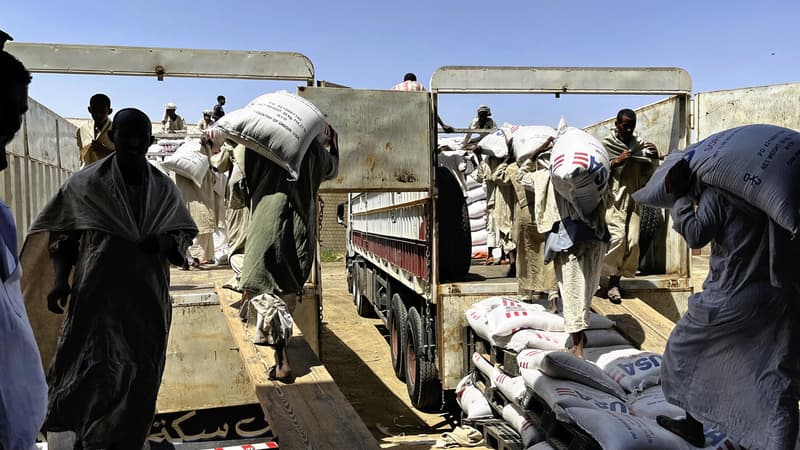After almost 15 months of war, the famine threshold was surpassed in northern Darfur, Sudan, said the Hambruna review committee, a surveillance system developed by independent experts, in a report published this Friday, August 1.
“It is the first time in more than 7 years, and the third time only since the creation of this surveillance system 20 years ago, that CEF reaches this conclusion,” said UNICEF, in a statement published Friday. “We are witnessing deaths due to hunger and malnutrition,” confirmed the Coordination Council of the Emergency Sases of Darfur Du Nord, cited by the Tribune de Sudan.
“The consequences of an atrocious war”
“The famine hits part of Sudan, which inflicts unimaginable suffering for children and families already devastated by the consequences of an unbearable war,” Catherine Russell deplored, UNICEF CEO.
Therefore, almost 755,000 people, “who live in catastrophic conditions,” suffer “a serious decrease in food and nutritional security,” says the committee. “The situation remains critical throughout the country, where, according to forecasts, around 730,000 children will suffer this year due to severe acute malnutrition (MAS), the most dangerous way of malnutrition,” says UNICEF.
The conflict, which made tens of thousands of deaths and forced more than 14 million people to flee, within the country and outside, caused “the worst humanitarian crisis in the world” according to the UN.
A famine that “probably” will continue
According to the report, Phase 5 of the classification of the Integrated Framework of the Food Safety Classification (CPI), the “highest seriousness of the acute food insecurity scale” will continue “probably” between August and October.
The Zamzam camp is not the only one that is exposed to the risk of famine, many other Sudan regions are also affected, especially in the El Pasher region, where the fields of Abu Shouk and Al Salam, in Khartum and in the states of Kordofan and Al-Jazirah are also affected.
“The most serious food crisis in the world”
The report insists on “the urgent need to evaluate the presence and size of populations in these areas, as well as their food security, their nutrition and their health status as soon as possible.”
According to the conclusions of the report, the war and the lack of humanitarian access, “two problems that can be resolved immediately with the necessary political will,” are the main factors behind the famine.
“We must urgently expand humanitarian access to be able to stop the famine that fell on northern Darfur and avoid spreading to all Sudan,” said Cindy McCain, executive director of the World Food Program.
“The war in Sudan caused the most serious food crisis in the world, caused by a conflict and not by nature,” warned the World Food Program on July 9, a United Nations branch.
Failure conversations
This Monday, August 4, the UN Security Council must meet behind closed doors to discuss the situation in Sudan. A new mediation attempt to end the mortal war in Sudan failed this week, the United States has failed to gather key international actors in Washington.
In the field, the Sudanese Army and the Fast Support forces (FSR) established competitors and seek to extend their territorial control, with particular fierce battles in northern Darfur and Kordofan (west).
Since April 2023, the war between General Abdel Fattah Al-Burhane, head of the Army, and his former deputy Mohamed Daglo, known as “Hemedti”, the FSR commander has left tens of thousands of dead and millions of displaced people, causing what the UN describes as “worse humanitarian crisis in the world”, with destruction, hungry and cholera.
On April 15, 2024, Emmanuel Macron had given a speech that asked “to act collectively in favor of international peace and humanitarian law” during the International Humanitarian Conference for Sudan and neighboring countries. Several months later, the President of the Republic had asked “a fire.” Since then, he has not spoken publicly and the situation in Sudan has worsened.
The role of the United Arab Emirates said
Roded by a humanitarian crisis, Sudan remains without an operational government after taking the power of the military in October 2021 and the resignation of the Prime Minister in January 2022.
Jartum issued a request to the International Court of Justice last April, saying that the perpetration of “genocide, murders and forced trips” was possible “for the direct support provided by the Arab Emirates attached to the rebel militia of the FSR.”
The application was finally rejected by the ICJ, which was considered “manifestly incompetent to judge the request for Sudan.” If the United Arab Emirates have always denied it, Various media And the reporters on the site revealed the country’s support to the fast support forces (FSR).
Source: BFM TV


